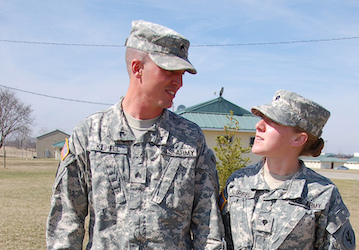 Dual-military couples—where both partners are Service Members—are more common today than they once were. While it can be a huge plus to have a partner who really gets the ins and outs of military life, it also can be difficult to navigate a relationship where both people are subject to deployments, relocations, and personal risk. If you’re in a relationship with someone who’s also in the military, learn about the issues likely to come up, so you and your partner can prepare accordingly.
Dual-military couples—where both partners are Service Members—are more common today than they once were. While it can be a huge plus to have a partner who really gets the ins and outs of military life, it also can be difficult to navigate a relationship where both people are subject to deployments, relocations, and personal risk. If you’re in a relationship with someone who’s also in the military, learn about the issues likely to come up, so you and your partner can prepare accordingly.
By the numbers
Overall, about 7% of active-duty Service Members and 2.6% of Reserve and Guard populations are in dual-military marriages. While romantic partners might come from the same or different branches, dual-military marriages are most common among members of the Air Force and Space Force (both active and reserve components). More than half of active-duty married couples don’t have children, while a slight majority of Reserve and Guard married couples do have children.

Gender considerations
While the same number of men and women are in dual-military marriages, a much higher percentage of female Service Members are in military marriages because there are fewer women in the military overall. About 1 in 5 active-duty women are married to another Service Member, compared to only about 1 in 25 active-duty men. Military wives are more likely than husbands to leave the Service because of family concerns. But if you’re a woman in the military, your chances of divorce are lower if you’re married to another Service Member than if you’re married to a civilian. (For men, marriage to a civilian spouse is more stable.)
Coordinate your career paths
As a part of the military, you’ve committed to much more than a job. It’s a commitment to a career and a lifestyle. While many couples appreciate the job security that comes with being part of the military, the structured career paths and “up-or-out” policies can make it tough to coordinate with your partner and be successful at the same time. Talk about how you want to handle things when career opportunities (and locations) conflict. Think about whether you both can handle a “commuter marriage” where you see each other only on weekends or holidays. Many couples choose to “take turns” every few years with whose career takes priority. Whether you’re able to coordinate your career paths or not, you’ll want to clarify your dual-military basic allowance for housing (BAH), because it differs if you live together, live apart, have dependent children, or for the U.S. Navy, if you’re both junior Sailors on sea duty.
Prepare for separations
Even if you’re married to another Service Member, the military will treat you and your partner as independent entities to maintain force readiness. That means there’s a good chance you and your partner will be separated for periods of time, especially if you serve in different branches or belong to different specialties or communities.
Set up a strong communication plan for your time apart and learn to optimize your time together. If you have children, you might want to discuss options around one of you being away while your partner stays put with the kids. Also, remember to use branch policies to your advantage by setting up your “join spouse” preferences to increase the chances you and your partner will be stationed together—or at least within 100 miles of each other.
- Air Force Join Spouse Program
- Married Army Couples Program[MR1]
- Navy Military Couple and Single Parent Assignment Program
- Marine Corps Dual Military Household Assignment Policy
Plan for child care if you have kids
Child care is already one of the biggest concerns when only one parent is in the military, but even more so when both parents are in uniform. With the long work hours, deployments, and relocations (especially separate relocations), it can be a real challenge to make sure your kids are well taken care of and to optimize your family.
Reach out to extended family, friends, and your community to help while you or your spouse (or both) are away. Each of you will want to set up a family care plan with the military and update it as needed. You also might need child care on short notice, so plan ahead. Meet with babysitters. Create a list of people you can call in a pinch. And make sure they have all the instructions they need when you’re away.
Keep in mind that dual-military couples tend to be favored for enrollment in DoD child-development centers, so tap your DoD resources for extra support. Make sure you also have the contacts for your units’ Family Readiness Group (Army and Navy), Family Key Group (Air Force), Family Readiness Program (Marine Corps), or Work-Life Program (Coast Guard).
Enhance your communication skills
Good communication is especially important for dual-military couples who are balancing careers, separations, and children. Check out HPRC’s resources for enhancing your communication skills:
- Communication strategies for couples
- Stay connected during deployment
- Boost your speaking and listening skills
- Validation during disagreements
- Building intimacy in your relationship
Bottom line
Partners in dual-military marriages are frequently pulled between their relationship and their careers. Successful navigation of both makes a big difference for overall force readiness. To optimize your career and your relationship, be sure you and your partner are prepared, practice open communication, focus on the positives, and stay informed.





